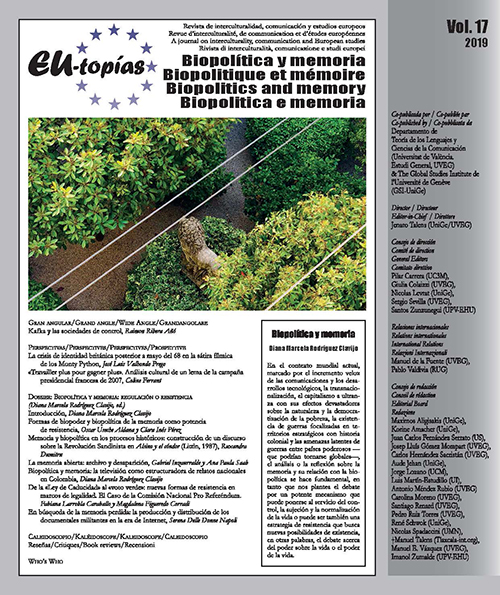From the «Law of Expiration» to the «Green Vote»: New Forms of Resistance in Legality Frameworks. The Case of the National Commission Pro- Referendum
DOI:
https://doi.org/10.7203/eutopias.0.18325Keywords:
Human rights, Law of Expiration, resistance, power, National Commission Pro-Referendum Abstract
Abstract
After more than 11 years of dictatorship, the first national elections were held in Uruguay, signaling the resumption of democratic life. In this context, the debate on how to deal with the human rights violations that took place during the civil-military regime gave rise to multiple disputes, displaying different strategies of confrontation between political and social actors, which made it possible to visualize the power relations at stake in such context. Criminal charges of kidnappings, disappearances and torture against the military produced important institutional movements that put in check the recently installed Colorado government. The consequence was the vote on the «Expiry Law» (Law No. 15,848) that directly checked the investigations in progress. In response, a resistance network was rapidly activated and coalesced as the National Pro-Referendum Commission, which sought the Law’s annulment through a Referendum. The article proposes a reading of the different power relations, the new actions of resistance in legal frameworks and the political strategies that culminate with the referendum of April 16, 1989.
 Downloads
Downloads
 References
References
ALLIER MONTAÑO, Eugenia (2010), Batallas por la memoria. Los usos políticos del pasado reciente en Uruguay. Montevideo: Trilce.
ANGENOT, Marc (2010), El discurso social. Buenos Aires, Siglo XXI editores.
ARELLANO HERNÁNDEz, Antonio (2015), «¿Puede la noción foucaultiana de dispositivo ayudarnos a eludir los resabios estructuralistas de la teoría del actor-red para avanzar en el estadio de la investigación tecno-científica?», México, en: Redes, vol. 21, n.o 41, págs. 41-74.
CENTRO URUGUAY INDEPENDIENTE (1987), Referéndum, Documentos. Serie documento político n.° 2, Montevideo.
CHOUHY, Lil Bettina (1989), Matilde. Montevideo: Trilce.
Campaña por el Voto Verde. Logo identificatorio de la campaña. Año: 1989.
DE GIORGI, Álvaro (2013), «Las defensas blanca y colorada de la ley: entre el mal menor y el “broche de oro” de la “restauración modelo”», en: Marchesi, Aldo (Organizador), Ley de Caducidad un tema inconclu- so. Momentos, actores y argumentos (1986-2013). Montevideo: Trilce, págs. 17-60.
DE GIORGI, Ana Laura (2014), Democracia y derechos humanos: claves de la reconfiguración de la izquierda uruguaya (1980 - 2014). Buenos Aires: Clacso.
DELEUZE, Gilles (1991), «Posdata sobre las sociedades de control», en Ferrer, Christian (Comp.), El Lenguaje Literario. Montevideo: Ed. Nordan.
DEMASI, Carlos y YAFFÉ, Jaime (Coord.) (2005), Vivos los llevaron: historia de la lucha de Madres y Familiares de Uruguayos Detenidos Desaparecidos (1976-2005). Montevideo: Trilce.
FERNANDEZ CONZE, Aracely (2014), La Democracia en transición. Las transformaciones del discurso de la transición en el semanario «La Democracia» (noviembre de 1984-diciembre de 1986). Montevideo: FHCE-UdelaR.
FOUCAULT, Michel (1978), Nuevo orden interior y control social, en Saber y verdad (1995). Madrid: La Piqueta.
— (1979), El Poder: cuatro conferencias. México: Universi- dad Autónoma Metropolitana (traducción y recopilación).
LARROBLA, Fabiana (2013), «El campo discursivo del pasado reciente en Uruguay. Entre la teoría de los demonios y la perspectiva del terrorismo de Estado, Resistencia: Universidad Nacional del Nordeste, Resistencia», en: De Prácticas y Discursos. Cuadernos de Ciencias Sociales, año 2, n.° 2. Buenos Aires: Clacso.
LARROBLA, Fabiana, et al. (2016), Avanzar a tientas. Cronología de las luchas por verdad y justicia 1985-2015. Montevideo: Mastergraf.
MADRES Y FAMILIARES DE URUGUAYOS DETENIDOS - DESAPARECIDOS (1990), El Referéndum desde Familiares, Montevideo.
RICO, Álvaro (2005), Cómo nos domina la clase gobernante. Orden político y obediencia social en la democracia posdictadura. Uruguay 1985-2005. Montevideo: Trilce.
SANGUINETTI, Julio María (2012), La Reconquista. Proceso de la restauración democrática en Uruguay (1980-1990). Montevideo: Taurus.
SEMPOL, Diego (2013), «A la sombra de una impunidad perenne. El movimiento de derechos humanos y la ley de caducidad», en: Marchesi, Aldo (Organizador), Ley de Caducidad un tema inconcluso. Momentos, actores y argumentos (1986-2013). Montevideo: Trilce, págs. 103-138.
TURNER, Victor (1974), Dramas sociales y metáforas rituales. Ithaca, Cornell University Press.
Downloads
Published
How to Cite
-
Abstract463
-
PDF (Español)137
Issue
Section
License
![]()
The authors conserve the copyright. All content published in EU-topías. Journal of interculturality, Communication, and European Studies are subject to the license Creative Commons Attribution-NonCommercial-ShareAlike 4.0 license. The full text of the license can be found at <http://creativecommons.org/licenses/by-nc-sa/4.0>
They may be copied, used, disseminated, transmitted and publicly displayed, provided that:
- The authorship and original source of the publication is cited (journal, publisher and URL of the work).
- They are not used for commercial purposes.
- The existence and specifications of this license of use are mentioned.
It is the responsibility of the authors to obtain the necessary permissions for images that are subject to copyright.



